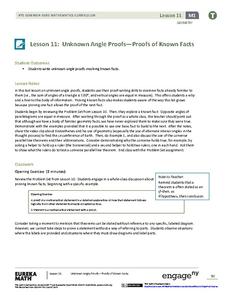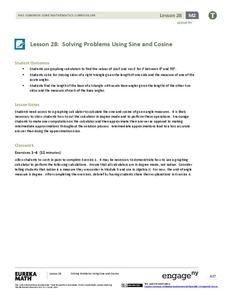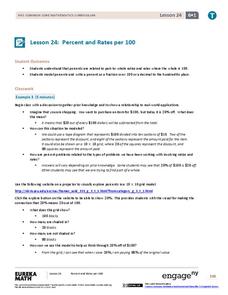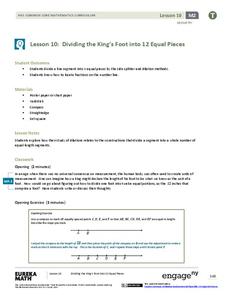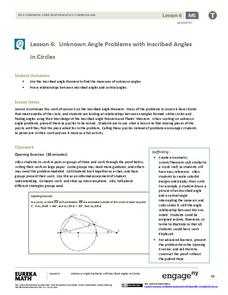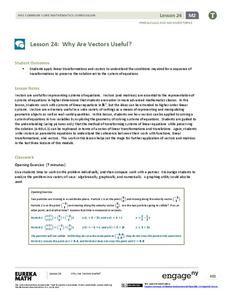EngageNY
Percent
Extend percent understandings to include percents less than one and greater than 100. A great lesson plan has pupils build upon their knowledge of percents from sixth grade. They convert between fractions, decimals, and percents that are...
EngageNY
Unknown Angle Proofs—Proofs of Known Facts
Lead the class in a Greek history instructional activity with a geometric twist. Pupils relate a short video about geometric properties to modern-day methods of solving for unknown angles. They discuss parallel line...
EngageNY
Solving Problems Using Sine and Cosine
Concepts are only valuable if they are applicable. An informative resource uses concepts developed in lessons 26 and 27 in a 36-part series. Scholars write equations and solve for missing side lengths for given right triangles....
Curated OER
The Great Gatsby Historical Background Using Multi-Genre Research Project
Before beginning F. Scott Fitzgerald's The Great Gatsby, create a historical context of the Roaring 20s with this instructional activity. Set up a gallery walk with the provided PowerPoint, which features 10 topics related to the...
EngageNY
Solving a Linear Equation
Solving an equation is the art of creating simpler equivalent equations using properties of equality. Here, classes see that solving an equation is not always as easy as guessing. The lesson presents linear equations that scholars must...
EngageNY
Percent and Rates per 100
What percentage of your class understands percents? Pupils learn the meaning of percents based upon rates per 100 in the 24th lesson in a series of 29. They represent percents as fractions, decimals, ratios, and models. The scholars...
Ed Galaxy
Postcard Template
Wish you were here! Have kids express their salutations and warm wishes with postcards. The worksheet provides two postcard templates for kids to address, sign, and illustrate.
Curated OER
The Search for Shangri-La
What is your idea of paradise? Middle and high schoolers share their visions of paradise on earth in this lesson, in which they view a video segment about Shangri-La. Your high schoolers can discuss and then write about their ideas in a...
Northern Ireland Curriculum
Me Inc.
Build your learners' self-esteem with a series of lessons that focuses on their identity and observation of the world around them. Applicable to many different subjects and lessons, the resources guide kids through the process of...
West Contra Costa Unified School District
Matching Quadratic Functions
Ever sigh when learners ask why they have to know so many different forms of the quadratic equation? Here is a lesson that comes in handy! Using hands-on matching activities, quadratic equations are explored through...
EngageNY
Dividing the King’s Foot into 12 Equal Pieces
Apply, apply, apply! A measurement lesson applies a number of concepts to help learn a new construction. Scholars learn to divide a segment into n equal parts using a method that uses the Side Splitter Theorem and a method that...
EngageNY
Multiplying and Dividing Expressions with Radicals
That's radical! Simplifying radicals may not be exciting, but it is an important skill. A math lesson plan provides explanations of properties used throughout the material. Scholars practice skills needed to multiply and divide...
EngageNY
Unknown Angle Problems with Inscribed Angles in Circles
We know theorems about circles—now what? Class members prove a theorem, with half the class taking the case where a point is inside the circle and half the class taking the case where a point is outside the circle. The lesson then...
EngageNY
Equations for Tangent Lines to Circles
Don't go off on a tangent while writing equations of tangent lines! Scholars determine the equations for tangent lines to circles. They attempt both concrete and abstract examples, such as a tangent line to the unit circle through...
EngageNY
Word Problems Leading to Rational Equations
Show learners how to apply rational equations to the real world. Learners solve problems such as those involving averages and dilution. They write equations to model the situation and then solve them to answer the question —...
EngageNY
Linear Systems in Three Variables
Put all that algebra learning to use! Using algebraic strategies, learners solve three-variable systems. They then use the three-variable systems to write a quadratic equation given three points on the parabola.
EngageNY
Why Do Banks Pay YOU to Provide Their Services?
How does a bank make money? That is the question at the based of a lesson that explores the methods banks use to calculate interest. Groups compare the linear simple interest pattern with the exponential compound interest pattern.
EngageNY
An Appearance of Complex Numbers 2
Help the class visualize operations with complex numbers with a activity that formally introduces complex numbers and reviews the visualization of complex numbers on the complex plane. The fifth installment of a 32-part series...
EngageNY
Complex Number Division 1
Conjugating in the math classroom — and we're not talking verbs! The seventh lesson in a series of 32 introduces the class to the building blocks of complex number division. During the instruction, the class learns to find the...
EngageNY
Matrix Multiplication and Addition
To commute or not to commute, that is the question. The 26th segment in a 32-segment lesson focuses on the effect of performing one transformation after another one. The pupils develop the procedure in order to multiply two 2 X 2...
EngageNY
Why Are Vectors Useful? 2
Investigate the application of vector transformations applied to linear systems. Individuals use vectors to transform a linear system translating the solution to the origin. They apply their understanding of vectors, matrices,...
EngageNY
Numbers in Exponential Form Raised to a Power
Develop an understanding of the properties of exponents through this series of activities. This third instructional activity of 15 explores the patterns associated with the power property. Scholars expand the powers before applying the...
EngageNY
Choice of Unit
Explore using units with scientific notation to communicate numbers effectively. Individuals choose appropriate units to express numbers in a real-life situation. In this 13th lesson of 15, participants convert numbers in scientific...
EngageNY
Volume of Composite Solids
Take finding volume of 3-D figures to the next level. In the 22nd lesson of the series, learners find the volume of composite solids. The lesson the asks them to deconstruct the composites into familiar figures and use volume formulas.



